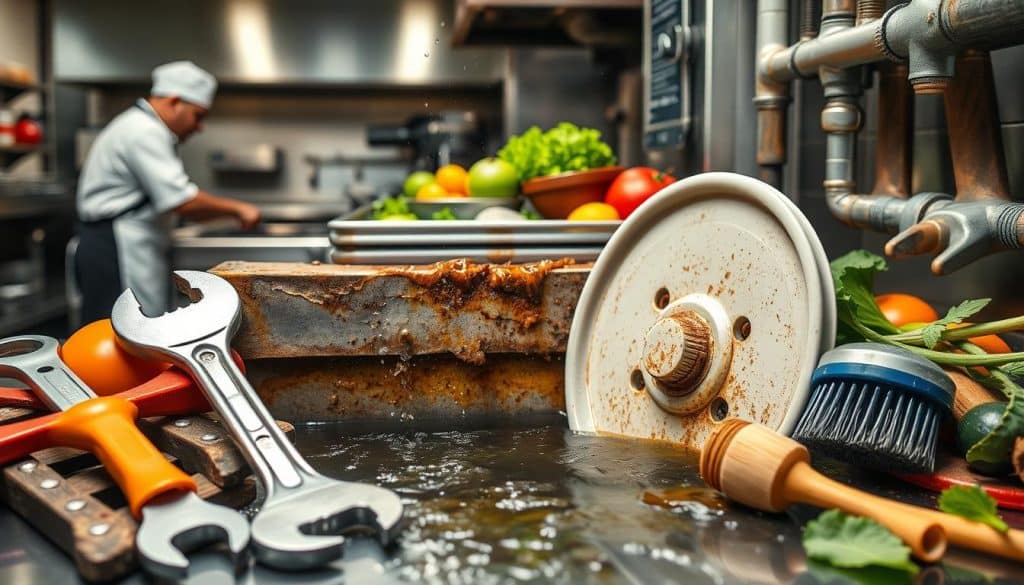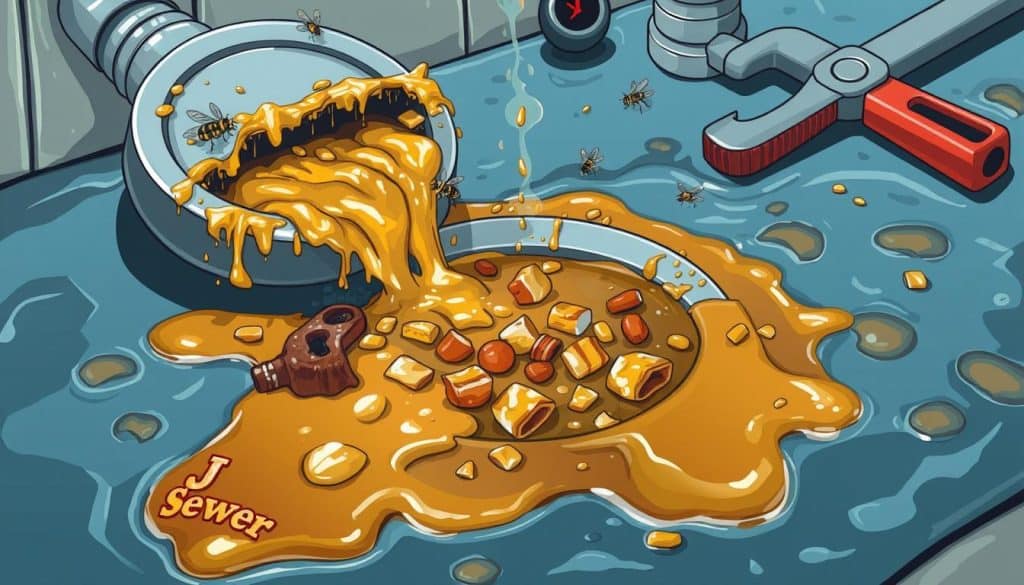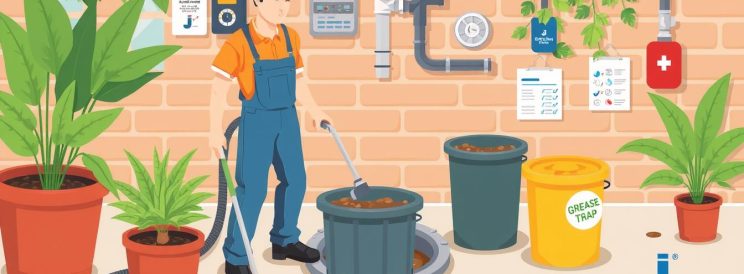Ever thought about the harm fats, oils, and grease (FOG) from your kitchen can do? What are The Best Practices for Maintaining a Grease Trap? Keeping them clean is not just good practice; it’s essential. But what’s the best way to clean a grease trap, and how do you set up a maintenance schedule?
Grease traps are key in places like restaurants and schools. They keep water flowing by catching FOG. Regular checks and professional care can stop bad smells, blockages, and expensive fixes. For top-notch service and to follow the rules, companies like J Sewer & Drain Plumbing Inc. in Chicago, IL, are great to have on your team.
Key Takeaways
- Implementing a regular grease trap maintenance schedule is crucial.
- Professional grease trap maintenance services can maximize efficiency.
- Preventing drain blockages and awful odors involves consistent care.
- Proper inspection and cleaning protect against costly repairs.
- Compliance with regulations ensures your establishment operates smoothly.
Importance of Grease Trap Maintenance
Keeping grease traps in good shape is key for smooth kitchen operations. It stops many problems before they start. With the right checklist and services, kitchens can run smoothly without issues.

Preventing Awful Odors
Grease traps help keep kitchens smelling good. If they’re not cleaned, they can smell bad. This can ruin the dining experience. Regular cleaning keeps the smell away.
Avoiding Drain Blockages
Not taking care of grease traps can cause big problems. Grease can block drains and cost a lot to fix. Following a maintenance checklist keeps drains clear.
Reducing Costly Repairs
Regular maintenance saves money in the long run. Neglecting grease traps can lead to expensive fixes. Professional services catch issues early, saving money.
Compliance with Regulations
Following local rules on FOG handling is important. It avoids fines and legal trouble. Companies like J Sewer & Drain Plumbing Inc. help with this in Chicago and nearby.
Proper Inspection and Cleaning
Keeping grease traps clean is key to a clean kitchen and avoiding big problems. A good grease trap maintenance schedule is vital for your kitchen’s smooth operation.
Regular Inspection Schedule
Having a regular check-up plan is crucial for grease trap care. Companies like J Sewer & Drain Plumbing Inc. suggest checking small systems monthly and big ones every three months. This helps catch and fix problems early.
Cleaning Frequency
Cleaning frequency depends on how much you use it and local laws. While you can do some cleaning yourself, experts are better for a deep clean. Most places need to clean theirs every month to stop grease buildup.
Using Professional Services
Getting help from professional grease trap maintenance services keeps you in line with laws. Companies like J Sewer & Drain Plumbing Inc. know how to handle grease trap care. They make sure your traps are safe and working right, avoiding any kitchen problems.
Best Practices for Staff Training and Waste Disposal
It’s key to follow waste disposal best practices in a kitchen. Knowing how to train staff on grease management and proper FOG disposal helps a lot. It cuts down on maintenance and makes things run smoother.

Training Staff on Grease Management
Teaching staff about grease management is very important. They need to know how to dry wipe pans before washing them. Also, they should understand the value of recycling waste cooking oil.
Proper Disposal of Fats, Oils, and Grease (FOG)
Getting rid of FOG the right way is essential. This means recycling or disposing of food waste properly. Doing this saves money on cleaning and is better for the environment.
Utilizing Disposable Strainers
Using disposable strainers in sinks helps a lot with FOG buildup. Training staff to keep kitchen exhaust system filters clean is also important. It makes the kitchen cleaner and more efficient.
Posting ‘No Grease’ Signs
Putting up ‘No Grease’ signs in the kitchen is a good idea. It reminds staff to follow waste disposal best practices. These signs help keep grease problems to a minimum.
What are the Best Practices for Maintaining a Grease Trap?
Keeping a grease trap in good shape is key for any food business. It’s important to check and clean it regularly. Make a checklist for grease trap maintenance to keep things consistent.
Some top tips for cleaning include setting up regular checks, watching how your trap works, and changing how often you clean it. This helps prevent clogs and backups.
It’s also crucial to dispose of waste properly. Teach your staff about managing grease to avoid wrong disposal. Having a ‘No Grease’ rule and using steel screens under sinks can cut down grease in the system. Adding enzymes can help break down grease, making things run smoother.
Getting help from experts like J Sewer & Drain Plumbing Inc. is a big plus. They do deep cleaning and maintenance that goes beyond what you can do yourself. This keeps your trap working well and meets health standards.
Having a detailed maintenance checklist, using professional services, and training staff are the main steps to good grease trap management.
Conclusion
Keeping grease traps clean is key for commercial kitchens to run smoothly. Having a regular maintenance schedule helps avoid backups and expensive fixes. It’s important to check and clean grease traps often, either by doing it yourself or hiring a pro.
Following best practices, like disposing of fats, oils, and grease correctly, helps grease traps last longer. Training staff and using tools like disposable strainers can also improve kitchen cleanliness. Getting professional help is a good idea, especially in busy kitchens.
In Chicago, IL, J Sewer & Drain Plumbing Inc. offers great services. They guarantee parts and labor and have special deals for their customers. With a good maintenance plan and professional help, your kitchen will stay in top shape.






